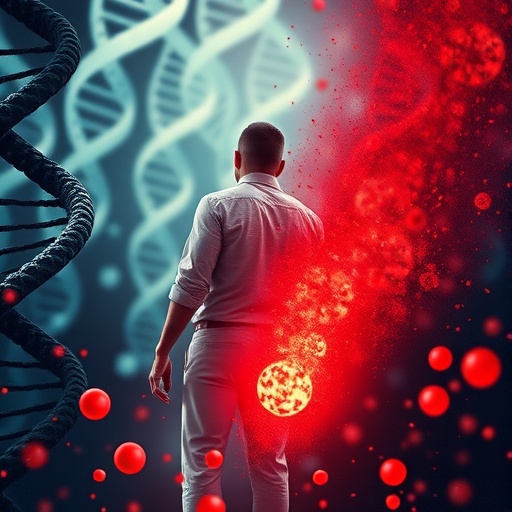The intricate relationship between hormone regulation and mental health has long fascinated scientists, particularly the enigmatic connection between testosterone levels and major depressive disorder (MDD). While prior studies have produced conflicting conclusions about whether testosterone influences depression, a groundbreaking new investigation brings clarity to this debate through a comprehensive genetic analysis. This study, recently published in BMC Psychiatry, explores the shared genetic architecture underlying testosterone traits and MDD, revealing a complex polygenic overlap that not only challenges current paradigms but also opens new avenues for therapeutic interventions.
Testosterone, widely recognized for its role in male secondary sexual characteristics, is also crucial in neuroendocrine functions and brain health. Yet, the association between testosterone levels and depression – a debilitating psychiatric condition impacting millions worldwide – has remained controversial. Traditional observational studies have struggled to disentangle causality from correlation due to confounding variables such as lifestyle factors and environmental influences. To address this, the research team harnessed the power of genome-wide association studies (GWAS) that scan the genome for common genetic variants influencing traits, allowing for an unbiased examination of the genetic basis shared between testosterone and MDD.
Using publicly available GWAS datasets for major depressive disorder and three specific testosterone-related traits – total testosterone (TT), bioavailable testosterone (BT), and sex hormone-binding globulin (SHBG) – the investigators employed sophisticated statistical modeling to map out genetic overlaps. Bivariate causal mixture modeling (MiXeR), a cutting-edge method, was utilized to estimate not just whether genetic correlations exist but how extensive and complex these overlaps are, factoring in the polygenic nature of these traits, where numerous genetic variants contribute small effects.
Results from the MiXeR analysis were revealing. The study uncovered a significant negative genetic correlation between MDD and both total testosterone and sex hormone-binding globulin, suggesting that genetic variants linked to higher testosterone levels might inversely relate to depression risk. Contrarily, bioavailable testosterone exhibited negligible genetic correlation with MDD, highlighting nuanced differences among testosterone measures and their genetic influences. Strikingly, nearly half – at least 47% – of variants associated with testosterone traits were predicted to exert some influence on MDD, indicating extensive shared genetic factors.
Further refining these associations, the research team applied conjunctional false discovery rate (conjFDR) analysis, a statistical approach designed to identify genomic loci jointly associated with both traits. This technique pinpointed between 28 and 79 shared loci depending on the trait compared, underscoring a substantial polygenic intersection. Notably, the gene NT5C2 emerged as a significant common locus simultaneously implicated across SHBG, total testosterone, and MDD, suggesting a pivotal role in the overlapping biological pathways.
Beyond gene identification, functional annotation of these overlapping loci revealed enrichment in immune-related pathways, hinting at an immunoendocrine axis potentially mediating the interaction between hormonal regulation and depressive pathology. These findings dovetail with growing evidence implicating immune system dysregulation and inflammation in depression etiology, while also recognizing the influence of hormones like testosterone in modulating immune responses.
Integral to this shared genetic architecture is the hypothalamic–pituitary–adrenal (HPA) axis, a master regulator of stress response and hormonal balance. The study emphasizes the HPA axis’s centrality in the pathophysiological processes linking testosterone regulation to depression risk. Dysregulation of this axis has been documented in both mood disorders and endocrine abnormalities, positioning it as a potential therapeutic target for interventions aimed at dual modulation of hormonal and mental health outcomes.
These revelations carry profound implications for personalized medicine. Understanding that considerable genetic overlap exists between testosterone traits and MDD suggests that future treatments could be tailored to individual genetic profiles, optimizing hormone-based therapies for depressive symptoms. This will be particularly invaluable for patients resistant to conventional antidepressants, offering hope for novel approaches rooted in genetic insights.
Moreover, the identification of key shared genes, such as NT5C2, opens the door for mechanistic studies to unravel how these genetic factors influence neuroendocrine circuits and immune pathways. Decoding these molecular mechanisms could facilitate the development of biomarkers for early diagnosis or risk prediction, enabling interventions before the manifestation of clinical depression.
This research also invites a re-examination of the role of testosterone supplementation in mental health management. Whereas historical debates have oscillated between beneficial versus detrimental effects of testosterone on mood, a genetically informed perspective now provides a refined framework. It suggests that the impact might be context-dependent, influenced by individual genetic backgrounds and the specific hormonal parameters affected.
Importantly, these findings highlight the necessity of considering sex differences in psychiatric genetics and endocrinology research. Testosterone levels and their genetic regulation differ substantially between males and females, as do depression prevalence and symptomatology. Future investigations should dissect how these shared genetic factors operate across sexes to fully elucidate the biological underpinnings of MDD.
In conclusion, by leveraging advanced genetic methodologies and large-scale data, this study compellingly demonstrates that major depressive disorder and testosterone regulation share extensive polygenic foundations. It moves the field forward by integrating hormonal and psychiatric genetics through the lens of shared genomic architecture, paving the way for innovative research trajectories and clinical paradigms that holistically address mental health through the interplay of genetic and endocrine systems.
As science continues to uncover the complex biological tapestries that shape mental disorders, findings like these remind us of the interconnectedness of bodily systems. The cross-talk between genetics, hormones, immune function, and brain chemistry is intricate but decipherable, and harnessing this knowledge promises transformative advances in the understanding and treatment of depression worldwide.
Subject of Research: Exploring the shared genetic basis between testosterone-related traits and major depressive disorder to understand their polygenic overlap and underlying biological mechanisms.
Article Title: Exploring the shared genetic architecture between testosterone traits and major depressive disorder
Article References:
Lu, W., He, X., Peng, H. et al. Exploring the shared genetic architecture between testosterone traits and major depressive disorder. BMC Psychiatry 25, 651 (2025). https://doi.org/10.1186/s12888-025-07096-5
Image Credits: AI Generated




